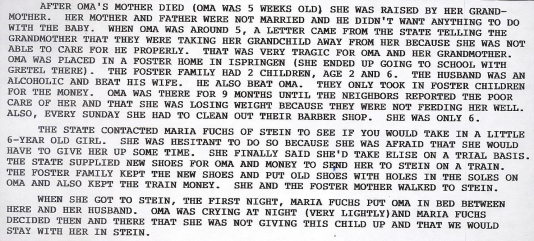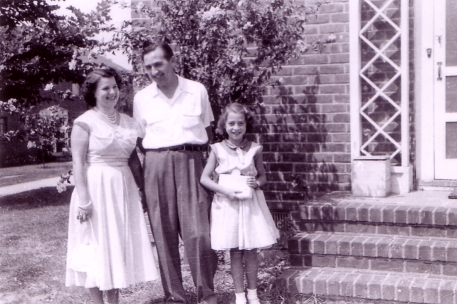So much of our history is recorded, remembered, and influenced by the views our male ancestors. But that’s only part of our story, and I am fascinated by the stories of our female ancestors. I have added a new blogging category called Women’s Words Wednesday where I will post and reflect on these important words that I have found in my research, in whatever form they arise (letter, photo, official document, etc.).
Below is a letter from my great-grandmother, Maine (Swank) Cubbage, to her sister Margaret (Swank) Speedy about the illness and death of her son George. It is known who has the original letter, but my mother transcribed it many years ago at a family gathering.
George Cubbage was about two years old when he died of diphtheria on Christmas Day 1921. He was the youngest of the eight children born to Charles and Maine Cubbage. George was buried on 26 December 1921 in Braddock (Russell) Cemetery, the same place where Charles and Maine buried their daughter Leah a year and a half earlier in 1920.
I can’t even begin to imagine what it must have been like for them. The letter mentions Charles (Charlie), some of their children (Lester, Marian, Minni, Artie) who were between ages 7 and 17. The letter also mentions Art (Margaret’s husband) and Bill, who was Maine and Margaret’s cousin who had lived with Charles and Maine for most of his life.
Monessen Jan 1 1922
Dear Sister
It has been a long time since I wrote to you. and what a lot has happened since then.
Just two weeks ago today I wrote you a long letter and told you all about my trip to Swissvale. George and I went on Friday and stay till monday. and Uncle George got our George a nice pair of tan shoes for his birthday. and he wore them home and that was the last he wore them he called them his pitty shoes. When I was writing that letter he was playing around here as well as he ever was. and him and Lester and Marian and I sat here until after eleven o’clock that night and him and Lester were carrying on high. you know how he was just at the age when he would try any thing or say any thing he saw the rest do. and he always was bright for his age. even the Dr. said he was a wonderful boy. Well we went to bed. and all went to sleep and about one o’clock he wakened me crying to get in my bed and coughed then just like the croup. he dedn’t sleep much untill morning about six he fell a sleep and slept until dinner time. I brought him down and he ate dinner with us we had soup and he was always fond of that and he ate some. but I saw what I thought was a very bad cold he was feverish and horse but didn’t seem to be sick. I dressed him and he played around a little while and then ask me to by O baby him. and I took him and he went to sleep. and when he woke up I saw he was getting worse. I greased him with campherated oil. but when Charlie got up at four o’clock he said if I were you I call the Dr. and tell him how he is and may be he want have to come so I did. But as soon as I told him he had a high fever and a croupie cough he said why that sounds like diptheria and I will be right over. he came over. he came and looked at him and at his throat and said that is what it is. and he said call up my wife and tell her I won’t be home for supper for an hour. he said put him to bed and I will be right back and he went but was only gone half hour and he came with the anti toxine and put it on both of his legs. and watched him for a while and then went but he said before he went he would be back in two hours and he would have to put a tube in his throat for it was closing up fast. he told us to be ready. he said he would have to have three to hold him and he said we would have to do it because we could not call any one else in. so we called Charlie home and we had everything ready when he came back. he looked at George and shook his head and said there is no use waiting. He is changing color now. So I held him in my arms and Charlie held his head and Marian his feet. and he got the tube in all right. and it was wonderful the change that came into his face. when I went out of the room he said if it had been two hours later he would of been dead. Well the next day he put more anti toxine in him and all the rest of them. he said it was the very worst kind of diptheria. it was the black diptheria. he put anti toxine in him four different times and we had to tie his hands down to his sides to keep him from pulling the tube out. he did get it out one night about one o’clock and started to choke right away and Marian called the Dr. and he came so fast. I don’t know how he got here – he just threw his over coat on over his pajamas and run. I thought that night he was gone for sure. I didn’t think he could stand to have it put in again but he did. Marian and I held him and he went to sleep as soon as it was in again. after that Charlie didn’t go to work no more he stayed home and we never left him night or day. he got over the diptheria all right. The Dr. took the tube out on the fourth day and he could breath all right but the next day we noticed he was worse and we called the Dr. to come right away and when he came and examined him he said phenonia had set in. he told us before that we would be lucky if we could get him through with out it. that was on Thursday that he said he had phenonia. well be both worked with him night and day and on Friday evening he turned over on his said and went to sleep and slept for over two hours. he was still sleeping when the Dr. came in at nine o’clock. he said how is he. neither one of use said a word for we didn’t know whether that was good or not. we thought he might be in a stupor of some kind. but when the Dr. looked at him he was just tickled to pieces. he said why his pulse is normal and he is sleeping just as natural as can be. we you can guess how we felt. well all day Saturday he seemed to improve and the Dr. was come in about nine o’clock in the evening to see him for the night. he said he is no worse only he was flity. he just talked all the time. well that night we both sat there untill two o’clock and then I laid down across the bed and slept till five and got us and Charlie layed down. and George knew us both all the time. he talked to me. and just coaxed me to take him up. he reached his arms up around my neck. and said by sehlep mama but I told him he would frize if I took him up. and then he said he was freezing just to get me to take him and that is the way he talked on and I gave him watear as he called it at half past six. and then I noticed a change in him and I called Charlie and said this baby is worse or dying and Charlie jumped right up. but George just gasped three times and was gone. the Dr. got here in time to see him breath his last. he said he had phlurises of the heart is what made him go so quick. he heart got paralised. well I have told you the best I could all bout his sickness. but I can’t attempt to tell you what a house this is. they all thought so much of him and he was always ready for mischief. I thought it was hard when I couldn’t be with Leah when she died. but I found out that is not the hardest part of death. we could fix Leah just the way we wanted to and the kids could all kiss her good by. but as soon as George died, the undertaker came and I got the clothes ready that I wanted on him. but he said. I am very sorry but we are not allowed to dress him. I said well if I had known that I would have dressed him my self but he said he would of had to take them off again. It was the law. he just rapped and rapped him in white muslin and layed him on a stand that he had and left him in the room until the health officer came – and he sealed the room up and disinfected the room body and all and left it that way for two hours and then the undertaker came and put him in the casket with a glass top and all you could see was just his face not even his hair nor his ears nor his hands. it was supposed to be sealed but I found out it wasent. I found the catch on it and opened it. and kissed him. no one knows that but you now. I wish now that I had let the kids kiss him too. I don’t think it would of hurt them. we were not allowed to have no funeral just the family and no one was allowed to come in all the time he was sick or we of been fined $50. They allowed the men to go to work but they were not allowed to go near his room. that is why Charlie quit work and stayed home and helped nurse him. We had two large cars. Charlie and I and Lester and Minni and the casket went in one and the rest of them and the minster went in the other one. that roads were awful rough too. Poor Bill is taking it awful hard. he dont cry he just groans and that is worse. They took the sign down yesterday and Charlie is going back to work to morrow and the kids to school. then is when I will miss him more than ever for he was always where I was. Lester and Bill have no work the mill shut down the day before Christmas. I don’t think I will ever think the same of Christmas again. The kids were waiting on Christmas they had been saving their pennies to get trimmings for a tree. I had told them if they got enough trimmings I would get a tree. they wanted one so bad for George. Artie had got him a little tin??? as George called them. he was crazy about autos. Bill was planning to go to Pittsburg after Christmas and get him one that he could ride in. but he never saw any thing he got for Christmas. They are all wrapped up yet. I hadent got him anything yet, we had him down street the Saturday evening before he got sick and he saw santa claus. and shook hands with him. I intended to get him a kick a bobcle. we could hardly get him away from them but we didn’t get down street again and when I called up the store where they was Friday evening they were all sold. they said they would have some in on Tuesday and Charlie said that would be alright for he would not be able to play Christmas any how. and sure enough he wasn’t. I think I have told you all now. if there is any thing else that I have forgot to tell you, why you ask me and I will tell you. I took a wreath down for Leah’s grave. I couldn’t think of coming away and leaving flowers on one and nothing on that poor lone grave. George dident have as many flowers as Leah had but they looked nice. what he did have Bill got him a pillow that was a great deal bigger than the one Leah had and it said George across the center and Lester got him a big bunch of carnations. I tryed to get a bunch of sweet peas for Leah’s grave but I couldn’t get them. I am sending you a couple of little yellow flowers off George’s pillow. He was always picking dandelions. he said there were a tame dandelion with another name. Well I will close now. we are all well at the present and hope this will find you both the same. Tell Art that we both thank him for his offer. and if we find we cannot squeeze through we will be glad to know we have a friend waiting to help us out.
Good by
Your Sister
Maine
Wow. This is by far the most personal item we have in our family heirlooms and records. Maine’s words so clearly captured a mother’s grief.
“but I can’t attempt to tell you what a house this is … I thought it was hard when I couldn’t be with Leah when she died. but I found out that is not the hardest part of death.”
I think too of her sister Margaret who received this letter and learned of her nephew’s death (Leah had been visiting Margaret when she died). We have no pictures of George, and only a couple of Leah. I am so thankful that we have this transcription of Maine’s words to her sister, as heartbreaking as it is to read.
Have you found any letters or diaries in your family history? Have you read their words to better understand your ancestors?











